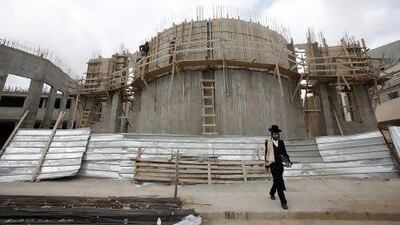RAMALLAH // The Israeli prime minister yesterday reacted coolly to a renewed Arab peace initiative, blaming the stalled peace process on the Palestinians' refusal to recognise Israel as a Jewish homeland.
"Until the Palestinians recognise our right to exist as a national state, no matter what the borders, and until they declare that the conflict is over, there will not be peace," Benjamin Netanyahu was quoted as saying by Israel's Haaretz newspaper, citing diplomatic sources.
Speaking to officials at Israel's foreign ministry, the Israeli leader made no mention of an Arab League initiative on Monday to revise its 11-year-old offer of normal relations with Israel to include possible land swaps in drawing the borders between Israel and a Palestinian state.
The league initially predicated its landmark plan in 2002 on a full Israeli withdrawal from the territories it captured during the 1967 Arab-Israeli war.
Mr Netanyahu's remarks was expected to complicate efforts by John Kerry, the US secretary of state, to revive the Israeli-Palestinian peace process. Mr Kerry has sought to use the 2002 plan as a sweetener to coax both parties back to the negotiating table.
The Israeli premier did not explicitly mention a the land swap deal, but warned that Israel needed a peace agreement "that will prevent Israel from becoming a bi-national state, but will provide stability and security".
He warned that the land swap, on paper, "doesn't promise a thing" and called for "reliable and durable" arrangements for Israel's security.
Palestinians said Mr Netanyahu's comments demonstrated his lack of seriousness in brokering a credible peace.
"Peace isn't on his agenda. What's on his agenda is expanding colonial settlements" on Palestinian land, said Xavier Abu Eid, spokesman for the Palestinian peace negotiations department.
In separate remarks yesterday, Gilad Erdan, Israel's communications minister, rejected the Arab initiative because he said it would mean using the borders that prevailed before the 1967 war as a basis for peace negotiations. Israeli officials, including Mr Netanyahu, consider those borders indefensible.
The Arab initiative would consider allowing Israel keep some of its settlements in exchange for comparable amounts of Israeli land allotted to a Palestinian state.
"If Israel agrees to come to the negotiating table while accepting in advance that talks would be held on the basis of the 1967 lines, there wouldn't be very much to negotiate about," Mr Erdan said.
He said Israel had a "right to settle" land wanted for a Palestinian state.
Officials in the Palestine Liberation Organisation (PLO) refuse to accord Israel the status of a Jewish state, arguing that they already formally recognised the country in 1988.
They demand that Israel stop constructing settler homes before peace talks can resume, which appears unlikely given the pro-settler composition of Mr Netanyahu's government. The last round of negotiations, in 2010, collapse because Israel refused to stop constructing settlements.
Israel has built some 50,000 settler units in the occupied Palestinian territories since Mr Netanyahu became prime minister in 2009, according to the PLO.
More than 500,000 Israelis live in settlements in the West Bank and the desired Palestinian capital of east Jerusalem.
hnaylor@thenational.ae
* Additional reporting by Agence France-Presse
twitter: For breaking news from the Gulf, the Middle East and around the globe follow The National World. Follow us

Netanyahu snubs Arab land swaps offer to renew peace negotiations with Palestinians
Israeli prime minister reacts coolly to a renewed Arab peace initiative involving possible land swaps, blaming the stalled peace process on the Palestinians' refusal to recognise Israel as a Jewish homeland. Hugh Naylor reports
Most popular today
